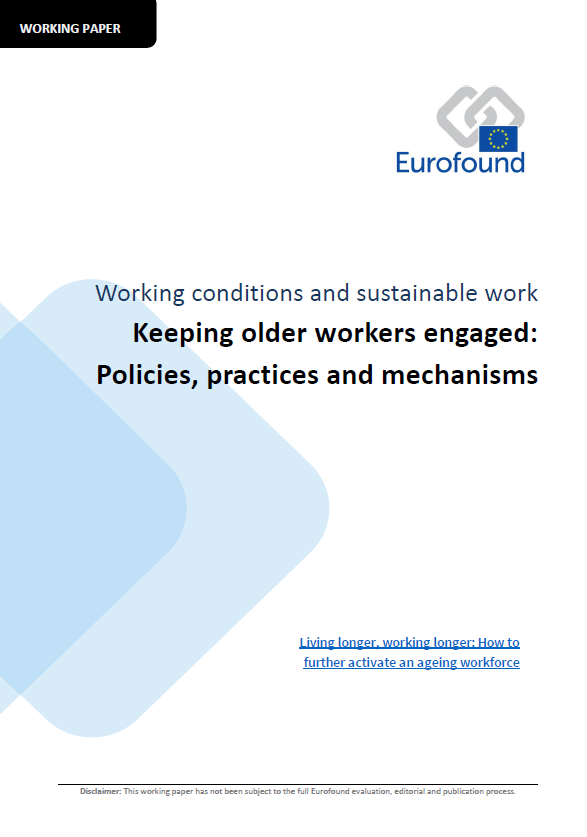EU context
Kljub znatni rasti stopenj zaposlenosti starejših delavcev v zadnjem desetletju v številnih državah EU je v skupnem poročilu Evropske komisije o zaposlovanju iz leta 2017 poudarjena možnost nadaljnjega povečevanja teh stopenj. Leta 2016 je bila v EU stopnja zaposlenosti starejših delavcev, starih od 55 do 64 let, 55,3-odstotna, medtem ko je bila pri osebah, starih od 15 do 64 let, 66,6-odstotna. Povečanje je največje pri starejših ženskah.
Evropski steber socialnih pravic zagotavlja okvir za pomoč pri prilagajanju trga dela novim izzivom, s spodbujanjem pravičnosti in solidarnosti med generacijami. Poudarja pravico do delovnega okolja, prilagojenega poklicnim potrebam delavca, da se jim omogoči, da podaljšajo svojo udeležbo na trgu dela. Poleg tega nedavni samostojni sporazum evropskih socialnih partnerjev o aktivnem staranju in medgeneracijskem pristopu vključuje zavezo za olajšanje udeležbe na trgu starejšim delavcem in omogočanje, da na njem ostanejo dlje časa.
Delo Eurofounda
Eurofound ima dolgo zgodovino strokovnega znanja na področju vprašanj, s katerimi se srečuje starajoča se delovna sila. Raziskave se od leta 1990 osredotočajo na udeležbo na trgu dela, delovno uspešnost, delovne pogoje in delovne preference starejših delavcev v političnem okviru spreminjajočega se demografskega profila Evrope. Delo se osredotoča tudi na javno podporo in pobude na ravni podjetij za spodbujanje zaposlovanja starejših delavcev. Proučujejo se starejše delavke, pri čemer se poudarja povečevanje stopenj zaposlenosti pri tej skupini in povečevanje njenega deleža v delovni sili, zlasti v starostni skupini 55–64 let.
Podatki iz raziskave
Obsežne raziskave Eurofounda zagotavljajo vrsto podatkov o položaju starejših delavcev. V šesti evropski raziskavi o delovnih razmerah (EWCS) so bili proučeni pogoji starejših delavcev, ob upoštevanju različnih razsežnosti kakovosti delovnih mest. Čeprav je pri starejših delavcih verjetnost, da postanejo brezposelni, manjša kot pri mlajših, podatki kažejo, da starejši delavci menijo, da v primeru, če postanejo brezposelni, ne bodo našli podobno plačane nove zaposlitve in bodo imeli celo težave pri ponovnem vstopu na trg dela.
V študiji, ki temelji na peti Eurofoundovi evropski raziskavi o delovnih razmerah (EWCS) so proučene značilnosti starejše delovne sile in dela v različnih starostnih obdobjih, pa tudi dejavniki, ki zagotavljajo trajnost dela starajoče se delovne sile: dobre delovne razmere, telesno in duševno dobro počutje ter ravnovesje med poklicnim in zasebnim življenjem.
Eurofoundova evropska raziskava o kakovosti življenja (EQLS) ponuja ugotovitve, povezane s starostjo, v zvezi z različnimi razsežnostmi kakovosti življenja v Evropi. Analiza delovnih preferenc po 50. letu temelji na ugotovitvah tretje raziskave EQLS in kaže, da številni starejši delavci raje delajo manj ur, tudi po upoštevanju njihovih finančnih potreb. Olajšanje tega tesnejšega usklajevanja delovnih ur s preferencami lahko omogoči ljudem, da delajo dlje, in jih za to motivira.
Daljša delovna doba
Eurofound se je nedavno pridružil trem drugim agencijam EU pri proučevanju starejšim prijaznega dela v Evropi, izzivov politike, povezanih s starajočo se delovno silo, in inovativnih rešitev.
Številni delavci niso sposobni ali niso motivirani za delo do zakonsko določene upokojitvene starosti. Vendar obstaja tudi skupina, ki je sposobna in pripravljena delati tudi po tem, ko doseže to starost. Eurofound je raziskal ta naraščajoči pojav nadaljevanja dela po upokojitvi.
Nedavna raziskava se je osredotočila na podaljševanje delovne dobe s prožnimi shemami upokojevanja, pri čemer so bile proučene zlasti sheme delnega upokojevanja, ki lahko to olajšajo. K daljši delovni dobi lahko prispevajo tudi pregledi na sredini poklicne poti. V raziskavi je bilo proučeno, kako lahko pomagajo pojasniti možnosti delavcev, da nadaljujejo z delom do višje upokojitvene starosti. V njih so poudarjeni različni instrumenti , ki so jih razvila podjetja, da bi zadržala starajoče se delavce.
Druga raziskava se je osredotočila na nacionalne in sektorske pobude vlad in socialnih partnerjev za zadržanje starejših delavcev na trgu dela, tudi s finančnimi spodbudami in izboljšanimi pogoji. Pri enem od prejšnjih projektov so bile analizirane pobude za upravljanje starosti, uvedene pred recesijo in po njej, za izpostavitev dobre prakse v podjetjih v Evropi.
Viri
















